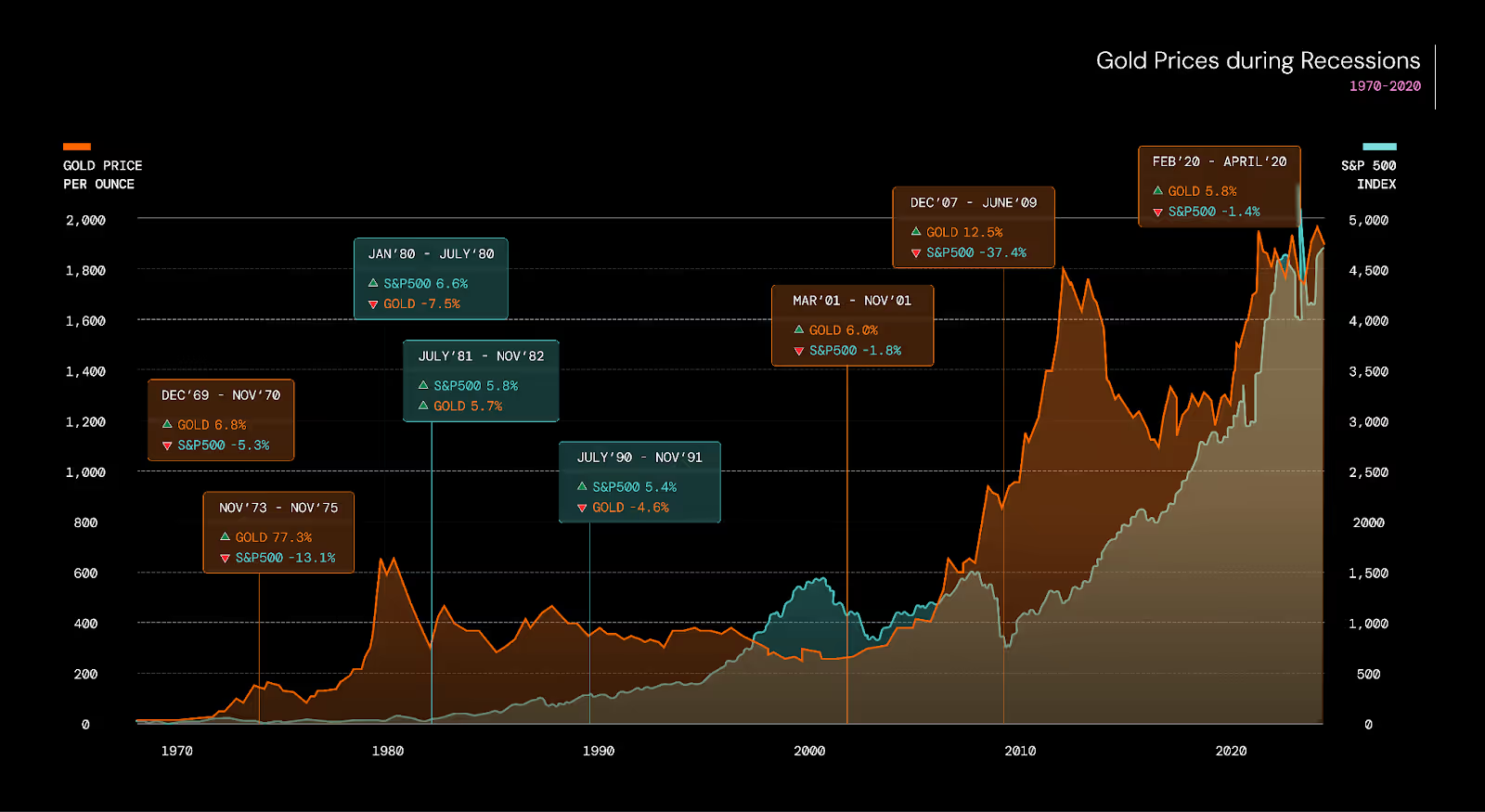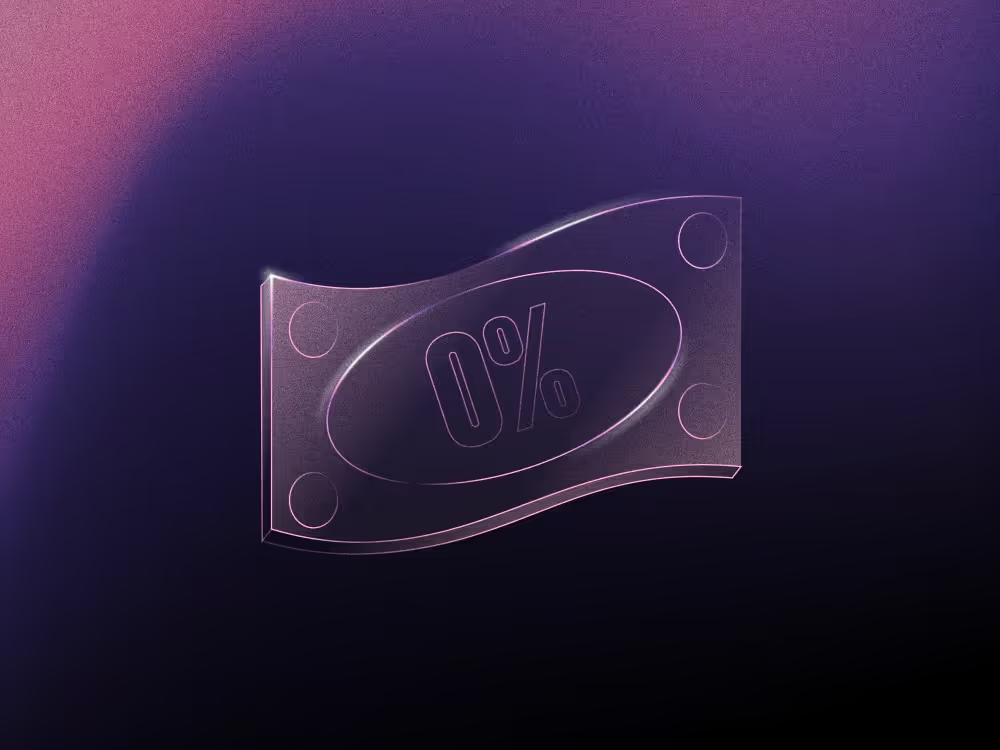Gold has a reputation for protecting wealth when stocks stumble. Yet, over the long term, gold often lags behind equities, making it a hedge rather than a growth asset.
In this guide, we’ll explore why investors add gold to their portfolios, how gold is performing in 2025, how it holds up during recessions, and how to invest in gold in the UK - from gold ETFs and ETCs to mining stocks and physical bullion.
Why invest in gold?
If you are a beginner, you might be asking why investors buy gold. Beyond looking pretty and being associated with wealth for millennia, there are several reasons investors choose to find a place for gold in their portfolios. Here are a few of the apparent advantages of investing in gold:
- Avoiding volatility: When markets turn turbulent, investors often flock to ‘safe haven’ assets like gold to reduce the impact of downturns on their portfolios
- Hedge against inflation: When fiat currencies are losing value, gold is seen as a way of maintaining purchasing power.
- Diversification: The price of gold historically has a low correlation to stocks and bonds.
- Global demand: Demand for gold crosses cultures and borders. Central banks across the globe also appear to be steadily increasing their gold reserves.
- Industrial uses: While not the primary cause for demand, industrial utilisation of gold is on the rise.
Perhaps the most notable of these is the metal’s apparent status as a ‘safe haven’ asset, with investors flocking to it when confidence in the market is low. But how reliable is this? As you can see from the graph below, gold has outperformed the S&P500 in five of the last eight US recessions, but it does not always beat the market.

Gold in 2025
At the time of writing, gold is on something of a hot streak. The metal has considerably outperformed the S&P500 across the year-to-date, with geopolitical uncertainty and central bank purchases among the reasons often cited for the upswing.
For more information about gold in 2025, check out our Weekend Read Deep Dive.
Four ways to invest in gold
Physical gold
First up is physical gold - the type you can hold in your hand. You can buy this in coin or bar form from bullion dealers, both online and in person. You will need somewhere safe to keep it though, and that doesn't mean the back of your sock drawer. If you invest in physical gold, consider a safe deposit box or paying a bank to look after your gold for you.
You cannot hold physical gold - like bars and coins - within a tax-efficient account like an ISA or SIPP. This means you will usually need to pay capital gains tax on any profits from the sale of your physical gold. However, all bullion coins produced by the Royal Mint are exempt from capital gains tax.
Gold ETCs
Exchange Traded Commodities (ETCs) are, as the name suggests, Exchange Traded Products (ETPs) that track the value of certain commodities. Different ETCs cover all sorts of commodities, including oil, lean hogs, and, you guessed it, gold.
In short, this makes them a quick and easy way to gain exposure to changes in price without having to buy and look after physical gold. With Freetrade, you can invest in ETCs such as the Xtrackers Physical Gold ETC and the WisdomTree Physical Gold ETC to gain exposure to the metal’s price changes in tax-efficient accounts like ISAs and SIPPs. This means your investment will not be subject to capital gains tax.
Gold mining stocks
Gold mining stocks allow you to gain exposure to the price of gold. However, consider that the performance of the company, including factors such as production and exploration success, will also contribute to a stock’s price.
Smaller pure play gold miners like B2Gold are likely to see their share price closely tied to the price of gold.
Larger mining companies can also offer significant exposure to price changes, but are more likely to also deal in other resources and thus offer some diversification. For example, Newmont is one of the planet's leading gold miners, but also mines copper, silver, lead and more.
Gold ETFs and funds
Speaking of diversification, gold ETFs and funds aim to offer just that. These assortments of gold-related assets offer varying degrees of exposure to the metal’s price. Ensure you read Key Investor Documents (KIDs) before making an investment decision.
Gold ETFs on Freetrade’s platform include the Legal & General Gold Mining UCITS ETF (Acc) and the AuAg ESG Gold Mining UCITS ETF (Acc).
Disadvantages of investing in gold
We have covered the reasons investors like the shiny stuff, but what are the disadvantages of investing in gold? Here are some of the commodity’s more negative traits:
- Lack of income: Unlike assets like dividend stocks and distributing funds, gold itself does not generate income or dividends. Investors may be able to get around this by seeking out gold mining stocks or gold-focused funds.
- Volatility: Gold’s price can be volatile in the short term. For example, in 1982, the metal’s price declined by over 60%.
- Long-term performance: Over very long horizons, stocks tend to outperform gold in real terms.
- Safety not guaranteed: Despite its reputation as a shelter from the storm, gold is not guaranteed to see you safely through market turbulence. As this article has already shown, it underperformed the S&P 500 in three of the last eight US recessions.
How to invest in gold
Freetrade users can invest in gold ETCs or gold mining stocks just as simply as they can back other ETFs, stocks, and funds.
To sign up with Freetrade and start investing in gold (and more), simply:
- Sign up to Freetrade via web or app
- Choose the investments you want in your portfolio
- Deposit funds and begin investing
Before investing, make sure to do your own research and consider what is right for your portfolio.
Investing in gold - FAQs
Do I have to declare gold to HMRC?
There are a few scenarios in which you need to alert HMRC or other UK authorities to your gold investment:
- You need to pay tax: If selling your gold means you exceed the annual capital gains allowance in a tax year, you need to tell HMRC. You can do this by filling out a self-assessment tax return.
- Inherited gold: Any gold owned by someone who passes away is considered part of their estate. This means it must be declared as part of any inheritance tax assessment.
- Crossing the border: If you enter the UK with more than £10,000 worth of physical gold, you must declare it.
Is it safe to invest in gold?
Gold is often referred to as a ‘safe haven’ asset, meaning that investors often turn to it when their confidence in the market is low. This is because it is perceived as having resilience during turbulent times.
However, this does not mean it is a ‘safe’ investment. Like most assets, gold can be subject to price fluctuations. If you are not sure about investing in gold, make sure to receive professional advice first.
In addition, investors who buy physical gold have even more safety concerns to consider. Make sure to buy from a reputable source and keep your gold in a secure location, like a safe deposit box.
Should I invest in gold or silver?
Gold and silver are both seen as hedges against inflation, but there are key differences between the two metals. Silver is currently cheaper and so has lower barriers to entry, but is more linked to wider market performance due to higher industrial demand. Gold offers greater diversification and tends to be less volatile.
Consider what is right for your portfolio before deciding to invest in either (or both) of the metals.
Freetrade does not give investment advice and you are responsible for making your own investment decisions. If you are unsure about what is right for you, you should seek independent advice. The value of your investment can go down as well as up and you may get back less than you invest.
ISA and SIPP rules apply. Tax treatment depends on your personal circumstances and current rules may change.
A SIPP is a pension designed for people who want to make their own investment decisions. You can normally only access your money from age 55 (57 from 2028).
Freetrade currently only supports Uncrystallised Fund Pension Lump Sums (UFPLS) for SIPP withdrawals.
Seek professional advice if you need help with your pension.




.avif)

.avif)





